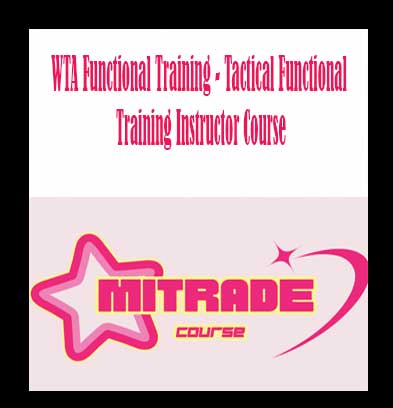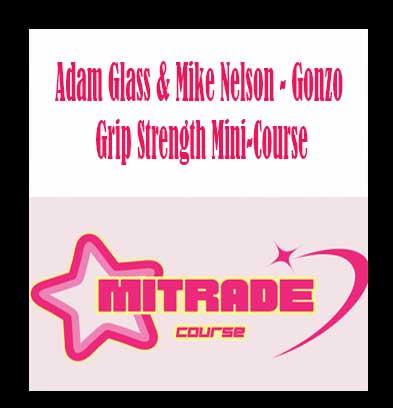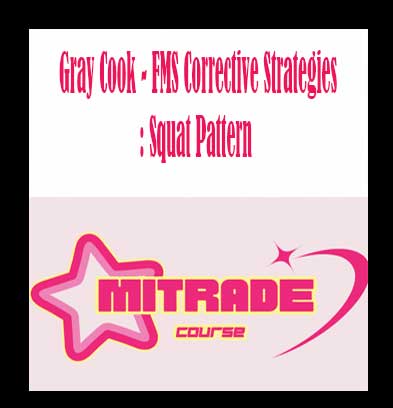WTA Functional Training – Tactical Functional Training Instructor Course
Description
Tactical Functional Training Instructor Course , WTA Functional Training – Tactical Functional Training Instructor Course download
WTA Functional Training – Tactical Functional Training Instructor Course
Speaking of the final recipient of a training programme and analysing their characteristics and objectives, it is clear that the physical conditioning for a national security operative is very different from the athletic conditioning for a sports discipline.
The fireman and the law enforcement operative, like the soldier who operates in the theatre of war, find themselves in a situation in which, at any moment, they can be called on to intervene in operative contexts characterised by the timeliness and effectiveness of action, in such a way as to be able to save the lives of others as well as to safeguard their own.
The athlete of any sporting discipline uses athletic conditioning to be able to fully express their physical and technical potential to the maximum on the day of competition.
The law enforcement agent, the soldier, and the fireman, in contrast, do not have a single day of the competition, for they must be ready every day!
From this brief analysis, it is clear that it is essential to adopt a system of training that brings an increase of all the physical qualities simultaneously in such a way as to aim at a medium-high level of physical conditioning throughout the year, even though they are not able to implement the type of Programming and Periodisation typical of the various sports disciplines.
The operative must have:
• joint mobility: to rebalance their body and not wear it down; prevent injuries and prepare it for the increase of the other physical qualities; and accelerate the phases of recovery;
• strength: to create a solid structure that sustains the daily stress, and from which to express the other physical qualities;
• proprioceptivity, agility, and reactivity: to develop the capacity to react to sudden events, a decisive quality for the success of operational activities;
• speed and power: to be incisive in operational actions;
• endurance: in order to be able to extend the numerous and cyclical operative demands in a lucid and effective manner over time, so as to condition the operative to act effectively under stress.
Another characteristic of the operative is that, during their day, they do not have a lot of time available to dedicate to physical conditioning, since they are continuously called on to perform their operative functions as well as technical training based on their specialty.
So, while on one hand it is crucial for an operative to have an optimal conditioning of all their physical qualities, on the other hand the operational commitments themselves often limit the availability of time and energy to devote to physical preparation.
The solution is to optimise the time and the resources that are available with a system of training that:
• continuously trains all the necessary physical qualities without favouring one at the expense of the others;
• allows for a quick adaptation of the physical qualities and an increase in their level, from an initial base to an advanced level, until reaching the phase of maintaining them throughout the entire operative season;
• allows the training of groups organised in functional units typical of the operative specialties; • allows for the execution of programs in any environmental context, without being forced to interrupt the preparation for operational commitments.
Tactical Functional Training ® is based on:
• the restoration of body awareness, a fundamental requirement for the postural recovery of the individual on which to construct all the necessary physical qualities;
• the recovery of joint mobility and of dynamic proprioceptive control, so as to construct the control of the body in space;
• the increasing of the Strength as the base physical quality from which the Endurance, the Speed, and the Power derive;
• the use of operative tools and protocols that train multiple physical qualities simultaneously, allowing for the optimisation of time;
• the adaptability of the protocols of work to the conditions and the level of the practitioner;
• the use of operative tools starting from one’s own bodyweight, and arriving at tools that make their adaptability to all the trainable physical qualities their essential technical characteristic, such as: Flying Suspension Training, Kettlebell, Clubs, Flowbag, Med Ball, Speed Bands, Power Ropes, etc. These tools also have the characteristic of being easily transportable and, therefore, usable practically anywhere.
Tactical Functional Training® was created by an Officer in the Italian Army who tested it in the field on thousands of soldiers until they arrived at a Method specific for the physical conditioning of operatives who must have all the physical qualities trained throughout the year and must be capable of operating in conditions of high psycho-physical stress without being subjected to injuries during the training.
Today, Tactical Functional Training® is used with great success by many military forces (special units of the military forces) and the police forces of many different countries throughout the world.
What you will learn:
// What distinguishes Tactical Functional Training® from the traditional systems of Physical Preparation for the Operative Forces;
// The differences between unidirectional sectoral training and multiplanar functional training in kinetic chains;
// Which body systems are fundamental for increasing the physical Performance of the operators, and how to train them in synergy with each other;
// How Functional Training is decisive in the construction of operators who are fast, explosive, reactive, and resistant, but who are also healthy and functional;
// What it means to train while respecting the Biomechanics of the body and the aspect of neutral posture;
// Which the principal fulcrums of movement are and which the fulcrums of body stability are, and how to use them effectively, both in practical exercises and daily movements, and in the motor patterns of the sports that are practiced;
// What the myofascial chains are, how they function, and how to best use them in the execution of the movements for improving the muscular activation and the coordinative and neuro-motor capabilities essential in Operative Forces;
// The difference between Global Joint Mobility and traditional Stretching;
// How to use the Core in order to better manage the kinetic chains in the multi-planar movement of the body;
// How to prevent injuries through Intelligent Functional Training, and how to implement strategies of post-traumatic recovery through intelligent body Movement;
// What the specific technical features are of the various Functional Training tools, and how to best use them according to the capacities and the levels of the operators;
// A logical and effective progression for teaching the technique of the exercises through a series of preparatory and complementary exercises based on the potential of each operator;
// The fundamental Evaluation Tests that must be made in order to correctly set up a functional training program aimed at the physical conditioning of the Operative Forces, and to evaluate the physical capacities over time;
// How to structure the most effective training strategies based on the operative contexts and the availability of time;
// How to best manage the sessions of Tactical Functional Training® with weekly and periodic operative activities;
// A fast and functional Coaching Method that has been put to the test in the field since 2009 by thousands of WTA Coaches and Trainers;
// How to use the competences acquired in the sale of Personal Training and Group Training services;
// What the professional prospects of a Tactical Functional Training® Instructor are.
Index of topics of the Course Program:
• The Tactical Functional Training® System: specific functional training for the military, police forces, and firefighters;
• The physical capacities that can be trained in Tactical Functional Training®;
• The possibilities of using Tactical Functional Training®: indoor and outdoor;
• The base principles that govern Tactical Functional Training®;
• Safety guidelines and preparatory warmup exercises;
• The exercises of Tactical Functional Training® with the use of:
– Primitive Functional Movement® (Joint Mobility and free body physical preparation executed on the ground);
– Calisthenics Functional Training® (free body training for the force in suspension from bars, parallel bars, and rings, and on the ground);
– Kettlebell Training (ballistic and force training with cast iron balls with a handle);
– Flying Suspension Training (training in suspension);
– Clubs (multiplanar ballistic training with weighted clubs).
• The Functional Evaluation of the operator: test of Joint Mobility and physical test under stress;
• The Programming of Tactical Functional Training® with the implementation of specific training protocols for the physical preparation of groups of operatives, and for the recovery of operative capacities of individuals;
• Effective Coaching of the Tactical Functional Training® System: communication and motivation;
• Aspects of sales and marketing of services related to the Tactical Functional Training® System.
Online Course: the Tactical Functional Training® Instructor Course is only available Online.
Exams
In WTA Courses, the exams are a fundamental part of the training process, as they allow both the WTA and the student to verify that they have correctly learnt both the theoretical concepts and the practical technical applications of the work program of the course.
In this way, 4 positive results are obtained:
1) WTA is sure to put only really prepared Trainers in the field;
2) the new Instructor feels confident that they have mastered the program of study and the executive technique of the exercises, therefore they feel ready to work with clients;
3) the clients who turn to a WTA Trainer are guaranteed to find professionals who are extremely competent and able to help them to reach their objectives;
4) the owners of gyms who employ a WTA Trainer are guaranteed to have professionals who are able to follow their customers in the best way, and to increase the volume of business of their gym.
The exams consist of:
– theoretical part: in which, through the writing of a thesis on a real case study selected by the student (focussed on a subject who must be one of their clients or themselves), the student demonstrates that they have acquired all of the theoretical principles that lead to the realisation of an effective training program for each specific client (following what has been explained in the course).
– practical part: in which, through the creation of a video, the student demonstrates that they have mastered the correct executive technique of the base exercises of the course program.
The exam is evaluated by a Tutor who is assigned to the aspiring Trainer at the time they present the exam. The Tutor will assist the student to pass the exam, providing any necessary corrections, both of the theoretical and the practical parts.
The common objective of the WTA and of the aspiring Trainer is to bring the training process initiated at the time of enrolling in the course to completion, so as to have a new WTA Trainer who is fully prepared to work in teaching the training Method learnt, in the most effective and efficient way possible!
Job prospects
On attainment of the Diploma, the Trainer, in addition to receiving the Diploma, is incorporated in the prestigious Official Register of WTA Instructors, within their own region.
This Register, in addition to being the only official document accessible to the public which testifies the real competence of the Trainer, is a true and proper Professional Database which is open both to clients who are looking for a competent Trainer in which to trust, and to the owners of gyms who are looking for Professionals to include in their Instructor Staff.
In fact, the high level of professionalism of the WTA Training, universally recognised since 2009 in all physical fields (from athletic conditioning, to medical gymnastics applications, to purely aesthetic fitness), allows the WTA Trainer to be inserted in any sporting environment in which the functionality of the Movement of the human body is indispensable for the health and efficiency of the person, be they an athlete of a specific sports discipline or a person who wants to recover or improve their state of health and physical form.
To date, the WTA Method, through the great work of over 20,000 Trainers trained since 2009, has been applied with great success in all professional sports, in medical and physiotherapy centres, and in thousands of private and commercial gyms.
In particular, the fields of application in which the WTA Trainer is most in demand are those relating to:
- Conditioning of Joint Mobility, prevention of injuries, and post-traumatic recovery;
- Conditioning of Functional Strength in Sports;
- High Intensity Functional Training;
- Increasing biomechanical and neuro-motor skills both for general and specific sports;
- Aesthetic training associated with the improvement of the Posture;Commonly Asked Questions:
- Business Model Innovation: Acknowledge the reality of a legitimate enterprise! Our approach involves the coordination of a collective purchase, in which the costs are shared among the participants. We utilize this cash to acquire renowned courses from sale pages and make them accessible to individuals with restricted financial resources. Our clients appreciate the affordability and accessibility we provide, despite the authors’ concerns.
- Tactical Functional Training Instructor Course
- There are no scheduled coaching calls or sessions with the author.
- Access to the author’s private Facebook group or web portal is not permitted.
- No access to the author’s private membership forum.
- There is no direct email support available from the author or their team.










Reviews
There are no reviews yet.